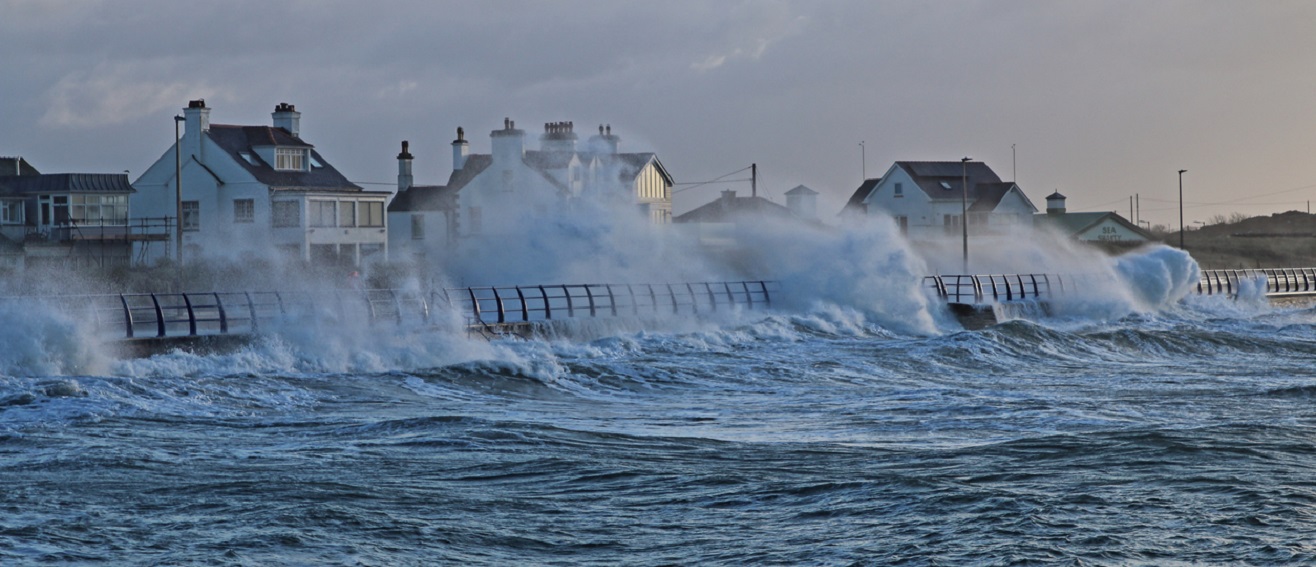
Coastal Hazards Research Group
The Coastal Hazards Group in CCiBSE specialises in understanding the interaction of extreme seas with the built environment. The research develops an understanding of the forces, sediment scours, and other failure modes at coastal structures, helping engineers to mitigate the effects of extreme coastal inundations. This is achieved through a combination of physical and numerical modelling techniques.
Members
Dr David McGovern (Group Lead, Academic Staff)
David has expertise in physical modelling of sediment scour and fluid structure interactions.
Professor Rodney Day - Academic Staff
Rodney is PVC of Research and Enterprise at LSBU, and has a track record of hydraulic engineering and scour.
Dr Keith Adams (Academic Staff)
Keith researches cascading hazard risk, with a focus on storm surge, extreme events, earthquake, landslides and tsunamis. Linear infrastructure and heritage structures are of particular interest.
Mr Carlos Gonzalo (Academic Staff)
Carlos has expertise in fluid mechanics and innovation development.
Dr Sabana Parvin (KTP PDRA)
Sabana is the KTP PDRA working on the TSuTwin Project. She has a PhD in Mathematics and expertise in CFD.
Niki Soleimani Amiri Niki is a PGR scholar (Jan 2024–2027) researching tsunami scour at onshore structures through experimental and numerical methods.
Collaborators:
We collaborate wiht a number of national and international academics and industrial partners including University College London, University of East London, The Open University, HR Wallingford and others.
Recent publications from the laboratory
- Tsunami boulder transport in coastal environments: insights from physical experiments and dimensional analysis
- Approaches to post-tsunami coastal reconstruction: comparisons across Indonesia, Thailand, and Japan
- Large-Scale Experiments On Tsunami Inundation And Overtopping Forces At Vertical Sea Walls
- Experimental observations of tsunami induced scour at onshore structures
CHG has attracted over £300k in funding since 2023.
2023 AKT269: Tsunami Experimental Study £36k, PI Dr McGovern
2024 - 2026: KTP LSBU HR Wallingford - TsuTWin. £200.000 PI Dr McGovern, Co-I Mr Carlos Gonzalo
Sept 2024 - May 2025: COASTVUL-SLR: Coastal Structure Vulnerability to Sea Level Rise. £8,998. PI Dr McGovern
Aug 2024 - Aug 2025: SRLanCER: Sea-Level Rise on Sri Lankan Coastal Environments: Risk, Vulnerability, and Impact. £9975. PI Dr McGovern
Jan 2025: Rising seas and collapsing walls; identifying the equitable data landscape. £20,000. PI Dr McGovern
Mar 2025: PoliSeaWall: (Supporting evidence-driven policymaking for seawalls to mitigate sea level rise). £125k (£31k) British Academy. PI Open Univeristy, Co-I USK Indonesia.
TsuTWin - Tsunami Twin Wave Generation Laboratory
TsuTWin is a £200k Knowledge Transfer Partnership (KTP) with HR Wallingford to develop the world's first physical laboratory for tsunami wave train and return flow generation.
Currently there is no method to generate the deadly return flow of tsunami - a major cause of destruction. Neither is there any method to generate repeat waves, otherwise known as tsunami wave trains. TsuTWin will change that by developing a laboratory generation system that will be able to generate incoming, returning and multiple tsunami waves. This will lead to better facilities for scientists and engineers to understand how these waves are so destructive and mitigate against them. Ultimately protecting life and property.
The project is funded by Innovate UK, PI Dr David McGovern, and administered by Nil Atmaca. For further information, please contact David McGovern or Nil Atmaca.
COASTVUL-SLR
Funder: Lloyds Registry Foundation
PI: Dr David McGovern
Co-I: Dr Ravindra Jayaratne (External, UEL)
COASTVUL-SLR will help reveal the effect of sea level rise on the future efficacy of contemporary coastal defence infrastructure in the UK. Specifically, how projected SLR will affect two damage pathways affecting coastal structures. 1) development of a large scour trench around structure foundations, and 2) hydrostatic and hydrodynamic loading on structures.
SRLanCER
Funder: LSBU REI
PI: Dr David McGovern
Co-I: Dr Ravindra Jayaratne (External, UEL)
Climate change (CC) and Sea Level Rise (SLR) pose a significant threat to current coastal defence infrastructure. This includes natural (e.g., mangroves, coastal forests, dunes) and artificial (breakwaters, seawalls, flood levees). CC & SLR is a worldwide issue, and less developed nations are, arguably at greater risk. For Sri Lanka’s coastlines there is a lack of knowledge of the vulnerability and mitigation strategies for CC & SLR due to a lack of academic expertise, and institutional and economic infrastructure. The academic purpose of this collaboration is achieved in an initial scoping project that will address this vulnerability and develop avenues for collaboration and further research.
Rising Seas
Funder RAEng
Sea level rise (SLR) due to climate change (CC) is putting coastal regions at risk of severe flooding. Seawalls defending coasts will require retrofit to mitigate SLR and extreme wave climates (EWC) associated with CC.
This initial scoping study will use case studies in the UK, Indonesia and Australia; each has different SLR forecasts, seawall asset distribution, design and ages, and socio-economic landscapes. Using remote sensing, open-source data, historical records, field and community surveys, the full data landscape will be identified and valued. To enable the framework for a large-scale multi-variate data analysis, machine learning tools will be employed to refine and group the case study variables to demonstrate vulnerability categories.
This will set-up the development of a global open-source tool and methodology for seawall-SLR vulnerability analysis.
Partner University of New South Wales (Sydney -Australia)
Partner The Open University
Partner The Technical University of Delft (Netherlands)
Partner Universitas Syiah Kuala (Indonesia)